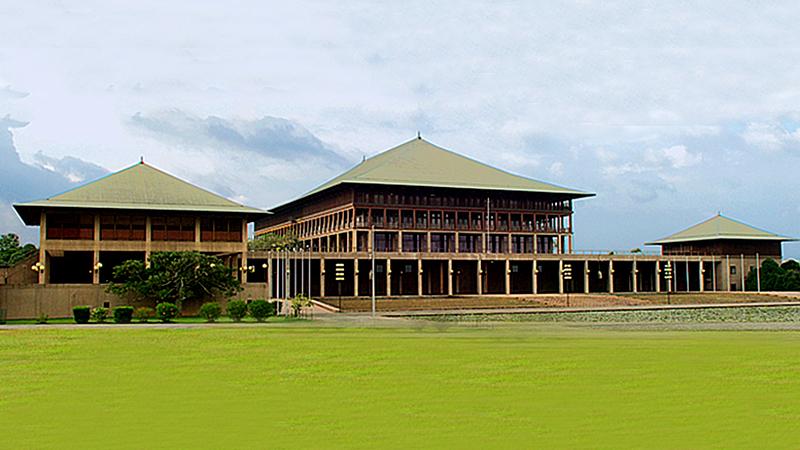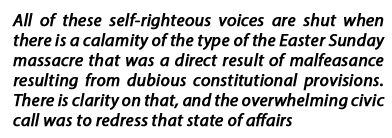
It is ironical that the sudden cluster outbreak of the Coronavirus that the country is now facing underlined the importance of decisive executive powers.
The Supreme Court has anyhow given the go ahead for the 20th Amendment virtually in its entirety, as the few areas of a vast Amendment that the Court considered and held to be inconsistent with the Constitution are already covered by the Committee stage amendments that have been proposed by the government anyway.
 The observations of certain other parties, sections of the Sanga for instance, also concern a very narrow bandwidth so to speak in contrast to the full spectrum of changes sought by the 20thAmendment.
The observations of certain other parties, sections of the Sanga for instance, also concern a very narrow bandwidth so to speak in contrast to the full spectrum of changes sought by the 20thAmendment.
As such, at this rather vital juncture with the new Covid-19 cluster still being battled, politics as usual by way of ceaseless opposition noise against the 20th Amendment should yield to greater cooperation in the task of contagion control.
The Supreme Court has — needless to say — given a legal interpretation and not a political opinion. That has taken the wind off the sails of the Opposition, which insisted that theirs is a battle for a legally sound interpretation of what they claimed was the unconstitutional nature of the 20thAmendment.
This was always a pretense. There is no way that the Opposition was fighting on legally solid ground, and its rank and file both was only too aware of the fact. This was a political battle, to essentially disrupt the implementation of the mandate given to the President.
It has now taken on the form of a politically expedient effort at raucous disruption and partisan dissent, and coming at this time of a transitional phase when the government is just beginning to pivot to a new era of getting things done, that’s absurd.
All of these self-righteous voices are shut when there is a calamity of the type of the Easter Sunday massacre that was a direct result of malfeasance resulting from dubious constitutional provisions. There is clarity on that, and the overwhelming civic call was to redress that state of affairs.
That mandate cannot now be distorted by saying that there is a new civil society consensus, pointing to a few objections made by certain government MPs who have focussed on a very narrow set of issues, and some members of the Sanga who have pointed to peripheral aspects of the Amendment.
Contend
The Opposition has been exposed, and is using the fig leaf of some dissenting sentiments from among a few of the government’s supporters to create the impression that there is a vast consensus against the 20th Amendment.
Nothing can be further from the truth.
This sleight of hand so early in the process of seeing an administration settling in, is not merely unbecoming — it’s a sign of an Opposition that’s unable to come to terms with itself, or with reality.
The government has bigger things to contend with. What’s happening in the department of pandemic containment is a worry — but there is little chance as of now of a fully blown spread of the virus that’s out of control.
This is in spite of the fact that there are many opportunists and sundry pundits willing to say otherwise. They say that the military involvement is one thing, and that the medical aspect of Covid-19 in Sri Lanka is entirely another.
They don’t seem to be comprehending that in these relatively early days of the pandemic, there is nowhere in the world that is working to any settled eradication paradigm.
All countries have tried methods their leaders have thought best, and some have failed spectacularly. But there isn’t any nation that can proclaim a full and complete victory that makes it possible for its leadership to say that they got everything totally right, and that they can be the ultimate exemplar in dealing with the pandemic.
So those who say that the military may contribute, but yet that’s quite apart from how the health experts are supposed to tackle the issue, are being prejudiced at best.
Effort
It’s a combination of strategies that are keeping the disease from being a full blown contagion in the country and the military is the linchpin of that concerted effort. To say that it’s the PCR tests and not the military contact-tracing and quarantine enforcement that’s the issue, is like saying that an army marches on its stomach and hence doesn’t need weapons.
At the time of writing, a quarantine curfew has been imposed in the Gampaha district until Monday, which means that there is a valiant effort going on to contact trace in the tried and tested way that worked the last time in this country.
The military is an indispensable part of that routine.
However, quite apart from the fact that there is a difficulty in some quarters to square with some home truths, the government — the country — will have to look for an exit strategy soon, not just from the pandemic, but the entire pandemic-related situation that includes the economy and the repercussions that come from the intermittent shutdowns, etc.
There has been an exit strategy, but each time there is a resurgence of the situation obviously that exit strategy becomes irrelevant as there is a new phase of the disease that requires a new approach.
The pattern just cannot recur indefinitely and this is true for this country as it is for many others.
How long can a recurring pattern of entries and exits into stages of lockdown or semi-lockdown last?
Theoretically, such patterns can recur, but in practice there is no way that any government can go on without having a comprehensive approach to the problem. In short, national leaderships everywhere would realise that stop-start reactions will have to give way somehow down the line to a comprehensive exit strategy that takes into account all aspects of the issue, which includes economy and other related factors.
Insecurity
This is not to say that the short term solutions that are sought by the Government should be challenged and ridiculed as they are trying to do in some quarters.
In the interim, there can be no alternatives to stop-start solutions, but the larger point is that a comprehensive exit strategy would have to evolve over time, and that does not mean the next three or four years — it means early next year perhaps, or sometime next year definitely.
There has been so much positivity in the country that there was a feeling the finest impulses of the Sri Lankans surface at a time of insecurity and collective stress. But that can-do attitude was in the business community and the wider swathe of the labour classes.
In civil society, they seemed to be enjoying the luxury of forced indolence at the time of angst! It seemed that the economy coming back to normal with the pandemic, they had taken its downturn as a licence to be farcical in their laziness.
There is no explaining otherwise, the absurd claims that were being made in some Opposition quarters about the economy — as if these people had no idea what was going on in the country, and that there was a pandemic!
Things seem to be coming to a head. The disruption that is being taken for granted cannot be taken for granted indefinitely.
The Opposition — almost high on the narcotic of defeat, since they don’t have to take responsibility for anything anymore — will soon have its day of reckoning. The pandemic imparts lessons. It’s likely that the Opposition’s punch-drunk post defeat gadabout will soon have to come to an end because the pandemic taking its current toll on everything, is not here to stay, no matter what anybody says.
